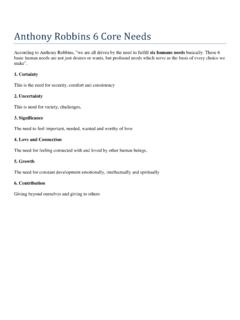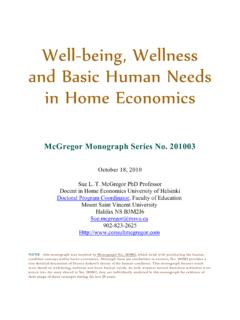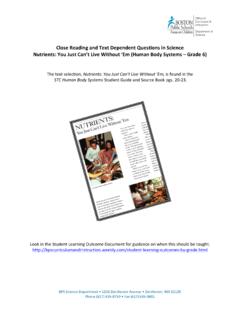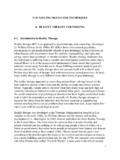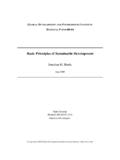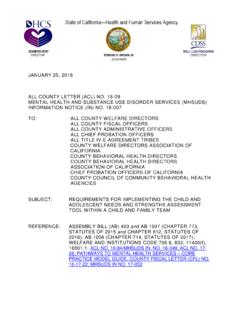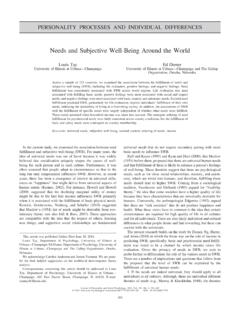Transcription of THEORIES OF BASIC HUMAN NEEDS - Yola
1 THEORIES OF BASIC HUMAN NEEDSMD. NURUZZAMAN, (Training), NAPD Humansneedanumberofessentialstosurvive AccordingtotherenownedpsychologistAbraha mMaslowandtheconflictscholarJohnBurton,t heseessentialsgobeyondjustfood,water,and shelter. Theyincludebothphysicalandnon-physicalel ementsneededforhumangrowthanddevelopment , HUMAN NEEDS Are ?"[H]uman NEEDS are a powerful source of explanation of HUMAN behavior and social interaction. All individuals have NEEDS that they strive to satisfy, either by using the system[,] 'acting on the fringes[,]' or acting as a reformist or revolutionary. Given this condition, social systems must be responsive to individual NEEDS , or be subject to instability and forced change (possibly through violence or conflict).
2 "--Coate and Rosati, "Preface," in The Power of HUMAN NEEDS in World Society, ed. Roger and Jerel A. Rosati, ix. Boulder, CO: Lynne Rienner Publishers, HUMAN NEEDS BASIC NEEDS theory elaborates the concept of BASIC NEEDS and its relation to psychological health and well-being; BASIC psychological NEEDS are a natural aspect of HUMAN beings that apply to all people, regardless of gender, group, or culture ; BASIC NEEDS Theory Abraham Maslow developed a theory of personality that has influenced a number of different fields. This theory accurately describes many realities of personal experiences . Maslow as a humanistic psychologist believe that HUMAN beings are not pushed and pulled by mechanical forces, either of stimuli and reinforcements (behaviorism) or of unconscious instinctual impulses (psychoanalysis).
3 Maslows s Hierarchy Of NEEDS Maslow has set up a hierarchy of five levels of BASIC NEEDS . Beyond these NEEDS , higher levels of NEEDS exist. In the levels of the five BASIC NEEDS , the person does not feel the second need until the demands of the first have been satisfied, nor the third until the second has been satisfied, and so on. Maslow s Hierarchic Theory of NEEDS These are biological NEEDS . They consist of NEEDS for oxygen, food, water, and a relatively constant body temperature. They are the strongest NEEDS because if a person were deprived of all NEEDS , the physiological ones would come first in the person's search for satisfaction. Physiological NEEDS When all physiological NEEDS are satisfied and are no longer controlling thoughts and behaviors, the NEEDS for security can become active.
4 Adults have little awareness of their security NEEDS except in times of emergency or periods of disorganization in the social structure (such as widespread rioting). Children often display the signs of insecurity and the need to be safe. Safety NEEDS When the NEEDS for safety and for physiological well-being are satisfied, the next class of NEEDS for love, affection and belongingness can emerge. Maslow states that people seek to overcome feelings of loneliness and alienation. This involves both giving and receiving love, affection and the sense of belonging. NEEDS of Love, Affection and Belongingness When the first three classes of NEEDS are satisfied, the NEEDS for esteem can become dominant.
5 These involve NEEDS for both self-esteem and for the esteem a person gets from others. Humans have a need for a stable, firmly based, high level of self-respect, and respect from others. When these NEEDS are satisfied, the person feels self-confident and valuable as a person in the world. When these NEEDS are frustrated, the person feels inferior, weak, helpless and worthless. NEEDS for Esteem When all of the foregoing NEEDS are satisfied, then and only then are the NEEDS for self-actualization activated. Maslow describes self-actualization as a person's need to be and do that which the person was "born to do." "A musician must make music, an artist must paint, and a poet must write.
6 " These NEEDS make themselves felt in signs of restlessness. The person feels on edge, tense, lacking something, in short, restless. If a person is hungry, unsafe, not loved or accepted, or lacking self-esteem, it is very easy to know what the person is restless about. It is not always clear what a person wants when there is a need for self-actualization. NEEDS for Self-Actualization The hierarchic theory is often represented as a pyramid, with the larger, lower levels representing the lower NEEDS , and the upper point representing the need for self-actualization. Maslow believes that the only reason that people would not move well in direction of self-actualization is because of hindrances placed in their way by society.
7 He states that education is one of these hindrances. He recommends ways education can switch from its usual person-stunting tactics to person-growing approaches. Maslow states that educators should respond to the potential an individual has for growing into a self-actualizing person of his/her own kind Maslow s Hierarchic Theory teach people to be authentic,to be aware of their inner selves and to hear their inner-feeling voices. teach people to transcend their cultural conditioning and become world citizens. help people discover their vocation in life,their calling, fate or destiny. teach people that life is precious,that there is joy to be experienced in life, and if people are open to seeing the good and joyous in all kinds of situations, it makes life worth living.
8 Ten Points that Educators should Address are Listed must accept the personas he or she is and help the person learn their inner nature. From real knowledge of aptitudes and limitations we can know what to build upon, what potentials are really there. must see that the person's BASIC NEEDS are includes safety, belongingness, and esteem NEEDS . should refreshen consciousness,teaching the person to appreciate beauty and the other good things in nature and in living. should teach people that controls are good,and complete abandon is bad. It takes control to improve the quality of life in all areas. teach people to transcend the trifling problems and grapple with the serious problems in include the problems of injustice, of pain, suffering, and death.
9 Ten points that educators should address HUMAN NEEDS theorists argue that one of the primary causes of protracted or intractable conflict is people's unyielding drive to meet their unmet NEEDS on the individual, group, and societal level. For example, the Palestinian conflict involves the unmet NEEDS of identity and security. Why the Concept of HUMAN NEEDS Matters The HUMAN NEEDS approach supports collaborative and multifaceted problem-solving models and related techniques, such as an analytical problem-solving process. These models take into account the complexity of HUMAN life and the insistent nature of HUMAN NEEDS . Problem-solving approaches also analyze the fundamental sources of conflicts, while maintaining a focus on fulfilling peoples' unmet NEEDS .
10 In addition, they involve the interested parties in finding and developing acceptable ways to meet the NEEDS of all concerned. HUMAN NEEDS theorists further understand that although NEEDS cannot be compromised, they can be addressed in a generally win-win or positive-sum wayArguments for the HUMAN NEEDS Approach many questions and uncertainties surround the HUMAN NEEDS approach. For instance, how can one define HUMAN NEEDS ? How can one know what NEEDS are involved? How can one know what HUMAN NEEDS are being met and unmet? Are HUMAN NEEDS cultural or universal in nature? If they are cultural, is the analysis of HUMAN NEEDS beneficial? Are some NEEDS inherently more important than others?
